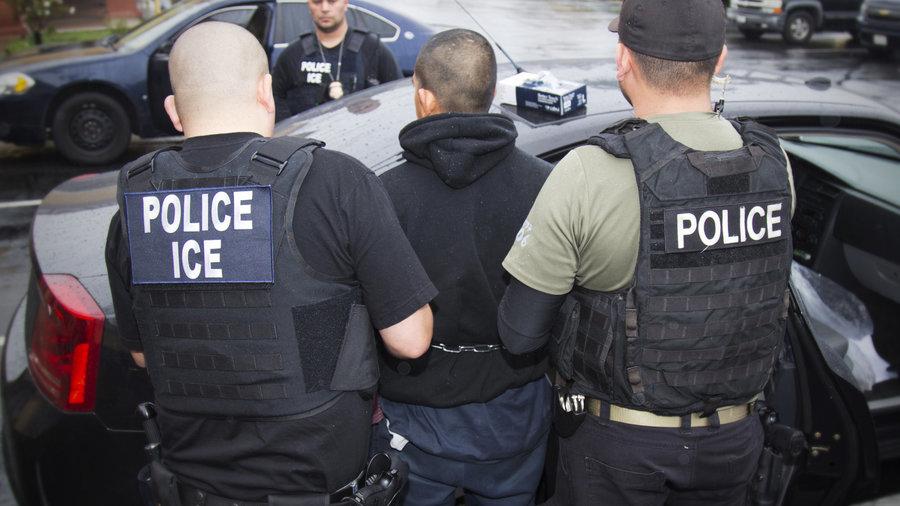ICE Faces Unprecedented Strain Under Trump"s Aggressive Deportation Agenda
The Immigration and Customs Enforcement agency, known primarily for its role in mass deportations, is currently navigating a tumultuous landscape under the Trump administration. With a staggering budget increase to $170 billion, including $30 billion specifically for ICE operations, the agency is being pushed to unprecedented extremes, prioritizing deportation quotas over genuine community safety. This increase reflects a chilling shift in focus, with the Trump administration"s goal set at one million deportations annually, an unrealistic target that many ICE agents deem physically and logistically unfeasible.
Morale Deteriorates as Agents Feel the Pressure
Current and former ICE officers have expressed deep dissatisfaction with their working conditions, often citing feelings of being vilified by the public and pressured by the administration to meet aggressive arrest quotas. According to reports, officers have been instructed to prioritize civil immigration arrests, diverting attention from serious criminal investigations. This shift has led to a disheartening atmosphere within the agency, as agents are forced to abandon cases involving drug trafficking and human exploitation to focus on apprehending undocumented workers and asylum seekers.

ICE agents ramping up worksite enforcement audits | Fox News Video
Mass Deportation Campaign Leads to Inhumane Conditions
As ICE detains nearly 60,000 individuals in facilities designed for only 41,000, the consequences of this mass deportation campaign are evident. Reports indicate that detainees are sleeping on floors and lacking basic necessities. The Biden administration"s previous approach, which focused on serious offenders, allowed for a more humane treatment of detainees. However, under Trump, the agency"s direction has shifted towards a draconian enforcement model that neglects the rights and humanity of those caught in its web.
Critics Highlight the Ethical Implications of ICE"s Current Mission
The current focus on deportation numbers over community safety raises ethical questions about ICE"s operations. Critics argue that internal enforcement not only infringes on the rights of immigrants but may also violate the basic human rights of individuals within U.S. jurisdiction, as noted in this study. The prioritization of statistics over justice creates a dangerous precedent that undermines the agency’s credibility and mission.

Daily White House press briefing to stay in the West Wing - for now ...
The Role of Politics in ICE"s Decision-Making
The political motivations behind ICE"s operations are becoming increasingly apparent, as the agency faces pushback from within. Numerous ICE employees report feeling contempt from administration officials who criticize them for being too passive during the previous administration. The fear of losing their jobs has led to a culture of compliance where officers feel they cannot advocate for a shift back to more ethical practices without risking their careers. As reported by ICE"s own statistics, the agency"s shift in focus has not only affected morale but also compromised the effectiveness of its critical investigations.
As the Trump administration continues to prioritize funding and operational mandates that lead to further marginalization of immigrant communities, the fallout from this policy will likely resonate beyond the immediate consequences. Workers within ICE, who once took pride in their roles as protectors of national security, now find themselves trapped in a morally ambiguous landscape where their duties conflict with their ethical obligations to the community.

![[Video] Federal officers deploy sting balls and flash grenades at Whipple Building](/_next/image?url=%2Fapi%2Fimage%2Fthumbnails%2Fthumbnail-1768340555229-vhfcc-thumbnail.jpg&w=3840&q=75)
![[Video] Crowd-control weapons used in Minneapolis as anti-ICE protesters attack police vehicle](/_next/image?url=%2Fapi%2Fimage%2Fthumbnails%2Fthumbnail-1768336302231-akxf7s-thumbnail.jpg&w=3840&q=75)

![[Video] Protests erupt in Minneapolis after ICE detains teenager, multiple arrests made](/_next/image?url=%2Fapi%2Fimage%2Fthumbnails%2Fthumbnail-1768331835371-z9ylqg-thumbnail.jpg&w=3840&q=75)


![[Video] Gunfire between Iraqi security forces and Sadr militias in Baghdad](/_next/image?url=%2Fapi%2Fimage%2Fthumbnails%2Fthumbnail-1768343508874-4redb-thumbnail.jpg&w=3840&q=75)
